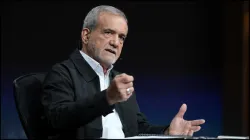Masoud Pezeshkian set to become Iran's new President: How will this impact ties with India?
Pezeshkian offers hopes of a pragmatic and reformist foreign policy that can impact its relations with India and Western countries. However, his capability of doing the same is in doubt as he is unlikely to challenge the authority of a hardline clergy led by Supreme Leader Ayatollah Khamenei.

Tehran: Reformist lawmaker Massoud Pezeshkian emerged victorious and is set to become Iran's next President, replacing Ebrahim Raisi after the latter's untimely death in a helicopter crash over a month ago. Pezeshkian's presidency promises a shift towards more pragmatic and reformist policies that will surely be tested in a hardline theocratic rule led by Supreme Leader Ayatollah Ali Khamenei.
Pezeshkian is someone world powers are likely to welcome, hoping he might pursue peaceful ways out of a tense standoff with Iran over its fast-advancing nuclear programme, according to analysts. He defeated hardline former negotiator Saeed Jalili, who is considered close to Khamenei and advocates closer relations with China and Russia.
While Pezeshkian's policies are cast in doubt due to the Supreme Leader's final say on all crucial state matters, he can set the tone for the foreign and domestic policy of the country. Therefore, it remains to be seen how his presidency can impact India's relations with Iran.
India-Iran relations
India and Iran enjoy decades of strong economic relations. Iran is one of India's key sources of crude oil amid the backdrop of Western sanctions. India's growing energy consumption deepens its economic cooperation with Iran due to the latter's vast hydrocarbon reserves. India's bilateral trade has also increased to $2.33 billion in 2022-23, making it one of the biggest trading partners in the Middle East.
A key factor of India's cooperation with Iran is also the Chabahar Port, which is an important transit point with Afghanistan and Central Asia and where New Delhi has invested heavily. In May, India and Iran signed a long-term contract for operating the Shahid-Beheshti Port Terminal to enhance regional connectivity and facilitate trade, particularly between India, Iran and Afghanistan.
This is a significant achievement for India as it is the first time it will oversee the management of an overseas port to provide a strategic connectivity link to Afghanistan, Central Asia, and the larger Eurasian space. India has pledged to invest $120 million in equipping the port. India has also offered an in-credit window equivalent to $250 million, for mutually identified projects aimed at improving Chabahar-related infrastructure.
Another platform for India-Iran cooperation is the multimodal International North-South Transport Corridor (INSTC) linking the Indian Ocean and the Persian Gulf to the Caspian Sea via Iran and onward to northern Europe via St Petersburg in Russia. This will enable India to reduce to time taken for shipments to reach Russia and will further boost trade with central Asian markets.
How will Pezeshkian impact India-Iran relations?
Prime Minister Narendra Modi's administration has pursued a strategic relationship with Iran. When Ebrahim Raisi was elected President, External Affairs Minister S Jaishankar was invited to his oath-taking ceremony in Tehran, becoming the first foreign minister to be invited to the event. India-Iran bilateral ties rose to new heights under Raisi, with overtures in the Chabahar Post deal and a visa-free policy for Indian tourists. Despite Iran moving closer to Russia and China and differences over Pakistan, both countries enjoyed close diplomatic relations while trying to expand their influence.
These ties are likely to deepen as Pezeshkian will take the helm later this month. The reformist candidate advocates warmer ties with the West and pragmatic economic reforms in Iran. If he is able to do so, this will loosen the constraints of bilateral trade between Tehran and New Delhi, which is in Iran's interest due to its flailing economy. Iran's envoy to India Iraj Elahi also asserted that the India-Iran relations are strong and will not be impacted by any president.
“We have signed different agreements. We have defined different fields for cooperation. Connectivity is the main part of our relation and culturally, we both countries have agreed to strengthen relations,” the envoy told news agency ANI earlier this month, adding that India is a rising power and the new president will bring new energy to the bilateral relations.
What are the challenges?
However, the developments will be dealt with a bit of caution under Pezeshkian's presidency. Firstly, it is unclear how he will be able to effect reformist policies in a country where a hardline cabinet in Khamenei's grip has the final say on all state matters. Second, Pezeshkian's stand on Iran's 'Axis of Resistance' and its decades of conflict with Israel will also impact India's tightrope diplomacy in the Middle East.
There have been reformist presidents in Iran's history like Mohammad Khatami and Hassan Rouhani, who have done little in opening up the system tightly controlled by the Shia cleric establishment. India has also had a troubled relationship with Rouhani, who has made controversial statements on Kashmir. Iran has routinely backed Pakistan on the Kashmir issue, and India's future commitment to ties with Iran will also be dependent on Pezeshkian's stance on the same.
Growing India-Iran ties will also be closely watched by the United States, which has imposed around 600 sanctions after the 2015 nuclear pact fell out under the Trump administration. Recently, the United States warned India of potential sanctions being issued if India does not back out of the Chabahar Port deal with Iran.
(with agency input)
ALSO READ | Who is Masoud Pezeshkian, a heart surgeon who is set to become Iran's next President?